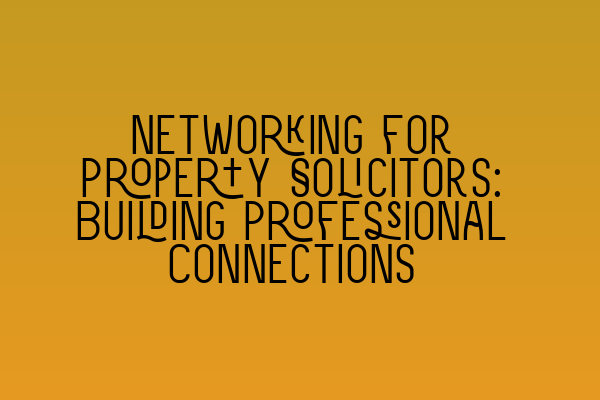Networking for Property Solicitors: Building Professional Connections
As a property solicitor, building and nurturing professional connections is crucial for your success in the industry. Whether you’re looking to expand your client base, gain referrals, or simply stay informed about the latest trends and opportunities, networking plays a vital role. In this blog post, we will explore the importance of networking for property solicitors and provide you with practical tips on how to build and maintain professional connections in the field.
1. Why is networking essential for property solicitors?
Networking is the key to unlocking a world of opportunities for property solicitors. By networking, you can:
– Expand your client base: Developing connections with fellow professionals, such as real estate agents, mortgage brokers, and property developers, can lead to referrals and new clients.
– Stay up-to-date with industry trends: Networking allows you to engage with peers, attend industry conferences, and join professional associations that keep you in the loop about the latest trends, regulations, and innovations in property law.
– Develop your knowledge and skills: Through networking events, you can interact with experienced solicitors who can provide insights and guidance, helping you grow both personally and professionally.
– Increase your visibility and reputation: Building a strong network can enhance your professional reputation, making you the go-to solicitor for property-related matters in your area.
2. How to network effectively as a property solicitor
Now that we understand the importance of networking, let’s delve into some actionable tips to help you build and maintain professional connections:
a. Attend networking events: Make it a priority to attend property-related conferences, seminars, and networking events. These gatherings provide excellent opportunities to meet and connect with professionals from all facets of the industry.
b. Join professional associations: Consider joining property law associations, such as the Law Society’s Property Section or the Property Law Association. These organizations not only provide networking opportunities but also keep you informed about the latest industry news, updates, and training courses.
c. Utilize online platforms: In today’s digital age, online networking is just as important as in-person networking. Leverage platforms such as LinkedIn to connect with fellow legal professionals, property experts, and potential clients. Ensure your LinkedIn profile is up-to-date and showcases your expertise in property law.
d. Develop a personal brand: Establish yourself as an expert in property law by consistently sharing valuable content through blog posts, articles, and social media updates. This will help you gain visibility and attract like-minded professionals to connect with.
e. Cultivate genuine relationships: Networking is about building genuine connections, so focus on developing meaningful relationships with your professional contacts. Take the time to understand their needs and challenges, offer assistance when possible, and follow up regularly to maintain the connection.
f. Be an active listener: When networking, listen attentively to what others have to say. Show genuine interest and engage in meaningful conversations. This can help you understand industry pain points, identify opportunities, and build trust and rapport with your connections.
g. Stay connected digitally: After meeting new contacts at networking events, connect with them on social media platforms like LinkedIn, Twitter, or Facebook. This ongoing digital connection will help you stay top of mind and continue building a strong network.
h. Give back to the community: Volunteering your time and expertise at industry events, mentorship programs, or charity initiatives can not only give you a sense of fulfillment but also enable you to forge new connections with like-minded professionals who share your values.
Remember, networking is a continuous process that requires time, effort, and persistence. It’s important to make networking a regular part of your professional life, dedicating time each week or month to attend events, reach out to contacts, and nurture existing connections.
Conclusion
Networking is an invaluable tool for property solicitors looking to thrive in their careers. By actively building and maintaining professional connections, you can open doors to new clients, stay updated with industry trends, and enhance your reputation as an expert in property law. Incorporate the tips provided in this article into your networking strategy and start reaping the benefits today.
Related Articles:
– For SQE 1 Practice Exam Questions, check out our SQE 1 Practice Exam Questions.
– Looking for SQE 1 Practice Mocks? Check out our SQE 1 Practice Mocks – FLK1 FLK2.
– To prepare for SQE 2, explore our comprehensive SQE 2 Preparation Courses.
– For SQE 1 Preparation Courses, visit our website here.
– Stay up-to-date with the latest SRA SQE Exam Dates on our website: SRA SQE Exam Dates.
